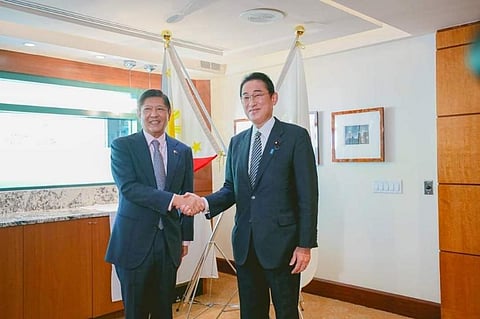
- NEWS
- the EDIT
- COMMENTARY
- BUSINESS
- LIFE
- SHOW
- ACTION
- GLOBAL GOALS
- SNAPS
- DYARYO TIRADA
- MORE

NEW YORK CITY — The Philippines and Japan have formed a common front in the region to foster peace, stability, and better quality of life while tackling "economic coercion."
Japanese Prime Minister Fumio Kishida and Philippine President Ferdinand Marcos Jr., who met on the sidelines of the UN General Assembly annual gathering, said measures will be taken to strengthen cooperation in sectors such as security, energy, and infrastructure.
Kyodo news agency said Kishida and Marcos exchanged views over the issue of "economic coercion," which the Japanese news outfit said is "a phrase often used as a veiled criticism of Beijing's extensive use of industrial subsidies to get other countries to make concessions."
Both also discussed regional issues including those related to the East and South China seas, the Japanese Foreign Ministry said.
Kishida and Marcos confirmed that their governments will plan for an early visit to Japan by the new Philippine leader, the ministry said.
"The two leaders met and discussed developments in Philippines-Japan bilateral relations," Press Secretary Trixie Cruz Angeles told the press covering the President's trip to the US.
"The two countries' strategic partnership, spanning 11 years now, witnessed tremendous growth and deepened cooperation in addressing their security and defense priorities, particularly in maritime security, maritime domain awareness, maritime law enforcement capacities, and peace in Mindanao," she explained.
Angeles added that during their meeting, the two leaders reaffirmed their commitment to reinforce ties and strengthen cooperation in response to the challenges and opportunities in the regional security and economic landscape.
President Marcos stressed that six years since the normalization of bilateral ties, both nations "have fostered one of the closest partnerships in the region."
"He shared his administration's priorities, particularly in the field of agriculture and food security, energy security, infrastructure development, and cybersecurity," Angeles said.
For his part, Kishida reiterated Japan's commitment to supporting the Philippines' economic development to become an upper-middle-income country.
Marcos aims to transform the Philippines to become a "moderately prosperous" country by 2040.
The Filipino Chief Executive is presently on the fourth day of his six-day working trip in the US.
US investors wooed
Meanwhile, Marcos sought partnership with investors from the US as the Philippines further reopens its economy amid the pandemic.
In a business dialogue with members of the US Association of Southeast Asian Nations Business Council and the US Chamber of Commerce, Marcos expressed optimism that the Philippines would be able to forge deals with more American investors and companies.
"We have to leverage whatever assets, whatever capabilities, whatever we have so that we can maximize our ability to grow and to pull the economy. Let us find new ways," Marcos said during his meeting with the business leaders.
"Let us find new ways to partner. Let us find new ways to develop. Let us find new ways to strengthen this relationship between the United States, ASEAN and the Philippines."
"And in that way, the synergies that we will find in that kind of relationship will be to the benefit of us all," he added.
Enlightening engagement
Furthermore, Marcos described as "enlightening" his meeting with the executives of American global food corporation Cargill.
Marcos said he and Cargill executives discussed possible cooperation in the field of agriculture.
"We discussed how to attain food security and self-sufficiency, and explored ways to boost agricultural productivity in the Philippines," said Marcos, who also serves as Agriculture Secretary.
Addressing UN member-states, Marcos emphasized the importance of the agriculture sector and food security in the development of the Philippines.
